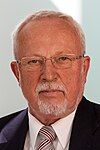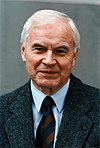East German general election,
1990 March 18 after 1932
| |||||||||||||||||||||||||
All 400 seats in the Volkskammer 201 seats were needed for a majority | |||||||||||||||||||||||||
| |||||||||||||||||||||||||

Maps showing the distribution of party votes per district.
The map in the bottom right shows the largest party in each district. | |||||||||||||||||||||||||
Legislative elections were held in the German Democratic Republic (East Germany) on 18 March 1990. It was the first and only free parliamentary election in the GDR, and the first truly free election held in that part of Germany since 1932. Four hundred deputies were elected to the Volkskammer.
The largest bloc was the Alliance for Germany, led by the East German branch of the Christian Democratic Union and running on a platform of speedy reunification with the West. The runner-up was the East German branch of the Social Democratic Party of Germany, which had been refounded only six months earlier. The former Socialist Unity Party of Germany, renamed the Party of Democratic Socialism, ran in a free election for the first time ever and finished in third place.
The Alliance came up just short of the 201 seats needed to govern alone.[1] Lothar de Maizière of the CDU, the early favorite to become East Germany's first freely elected prime minister, invited the SPD to join his Alliance partners – Democratic Awakening (DA) and the German Social Union (DSU) – in a grand coalition. The SPD was initially cool to de Maizière's offer, in part because of the presence of the DSU in de Maizière's grouping; the SPD had originally been willing to govern alongside all parties other than the PDS and DSU.[2]
On 5 April 1990, the new Volkskammer elected the CDU's Sabine Bergmann-Pohl as its president. As the State Council was at the same time dissolved, she became East Germany's interim head of state. Four days later, de Maizière announced that he had reached an agreement for a grand coalition consisting of the Alliance parties (the CDU, DSU and DA), the SPD, the liberal Association of Free Democrats (BFD), and one non-attached member. Between them, the three main partners in the coalition commanded a two-thirds supermajority in the Volkskammer, enough to pass amendments to the constitution.[3][4]
On 20 September of the same year, the Volkskammer voted by a 299–80 margin to accept the unification treaty, which had earlier been approved on a 442–47 vote by the West German Bundestag, and unify its territory with the Federal Republic of Germany, meaning that East Germany, after 40 years of independence, would cease to exist. The treaty took effect on 3 October.
Results[edit source]
 | ||||||
| Party | Votes | % | Seats | |||
|---|---|---|---|---|---|---|
| Alliance for Germany | Christian Democratic Union | 4,710,598 | 40.8 | 163 | ||
| German Social Union | 727,730 | 6.3 | 25 | |||
| Democratic Awakening | 106,146 | 0.9 | 4 | |||
| Total | 5,544,474 | 48.0 | 192 | |||
| Social Democratic Party | 2,525,534 | 21.9 | 88 | |||
| Party of Democratic Socialism | 1,892,381 | 16.4 | 66 | |||
| Association of Free Democrats | 608,935 | 5.3 | 21 | |||
| Alliance 90 | 336,074 | 2.9 | 12 | |||
| Democratic Farmers' Party | 251,226 | 2.2 | 9 | |||
| Green Party–Independent Women's Association | 226,932 | 2.0 | 8 | |||
| National Democratic Party | 44,292 | 0.4 | 2 | |||
| Democratic Women's League | 38,192 | 0.3 | 1 | |||
| United Left | 20,342 | 0.2 | 1 | |||
| Other parties | 52,773 | 0.5 | 0 | |||
| Invalid/blank votes | 33,263 | – | – | |||
| Total | 11,541,155 | 100 | 400 | |||
| Registered voters/turnout | 12,426,443 | 93.4 | – | |||
| Source: Pridham & Vanhanen,[6] Nohlen & Stöver,[7] IPU[8] | ||||||



No comments:
Post a Comment